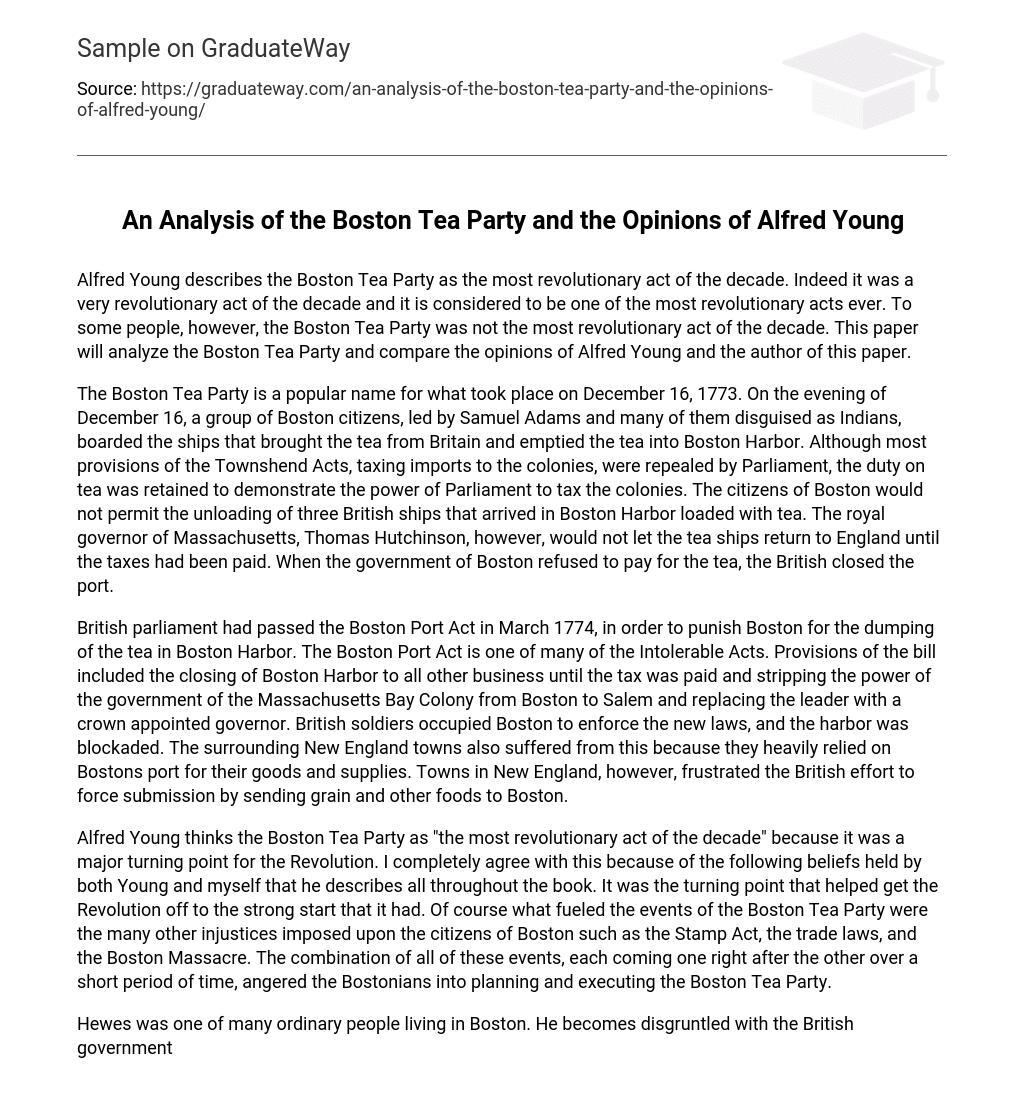Both Alfred Young and the author agree that the Boston Tea Party was a highly revolutionary act, making it the most significant event of its time. However, this essay will explore their differing perspectives on the revolutionary nature of this monumental event.
The Boston Tea Party took place on December 16, 1773. A group of Boston citizens, led by Samuel Adams, dressed up as Indians and boarded British tea ships in the harbor. They dumped all the tea into the water as a protest against Parliament’s tax on tea. Although most of the Townshend Acts were repealed, the tax on tea remained to show Parliament’s authority over the colonies. In response, Boston residents prevented three British tea-loaded ships from unloading in the harbor. Governor Thomas Hutchinson insisted that the taxes be paid before allowing the ships to leave. Since Boston refused to pay for the tea, Britain closed down its port.
In March 1774, the British parliament implemented the Boston Port Act as a punitive measure against Boston for the tea dumping incident in Boston Harbor. The Boston Port Act, which is a component of the Intolerable Acts, entailed the closure of Boston Harbor to all other activities until the tax was paid, and the transfer of authority from the Massachusetts Bay Colony’s government in Boston to Salem with a governor appointed by the crown. British soldiers were stationed in Boston to enforce these new laws, leading to a blockade of the harbor. The neighboring towns in New England were also affected since they heavily relied on Boston’s port for their goods and supplies. Nevertheless, these towns resisted British attempts to subjugate them by sending food such as grains to Boston.
Alfred Young asserts that the Boston Tea Party is regarded as “the most revolutionary act of the decade” because it represented a significant turning point for the Revolution. I concur with this viewpoint as we both agree on the pivotal role played by this event in initiating a strong start for the Revolution. The motivations behind the Boston Tea Party were undeniably driven by a series of injustices inflicted upon the citizens of Boston, including the Stamp Act, trade laws, and the Boston Massacre. These events transpired rapidly and stirred up anger among the people of Boston, ultimately leading to the planning and execution of the Boston Tea Party.
Hewes, a resident of Boston, became dissatisfied with the British government in 1763 during the French and Indian War. He was unhappy with his apprenticeship as a shoemaker and attempted to join the British army. However, he was rejected because he did not meet their height requirement (at least 5’2″) and because Roman Catholics were not allowed to enlist due to beliefs about the Pope being an enemy of Great Britain. This rejection greatly frustrated Hewes, especially as he witnessed further encroachments on liberty by the British through events such as the Stamp Act, trade laws, and the Boston Massacre. What sets Hewes apart is that he was an ordinary man in Boston, unlike more well-known figures in American history.
Hewes initially became involved in the Boston Tea Party after attending a meeting to discuss a plan for removing British ships from Griffin’s Wharf. The people of Massachusetts had requested a pass from the royal governor to return the ships to England and avoid high tea taxes, but their request was denied. While these meetings were typically exclusive to property owners, all citizens were allowed to participate regarding this specific issue. During these gatherings, individuals were assigned different roles for raiding the British ships. Although Hewes had a less prominent role initially, he desired greater involvement. To appear inconspicuous, Hewes visited a blacksmith’s shop and covered his face with soot, disguising himself as an Indian. In this disguise, Hewes actively took part in dumping tea onto one of the ships and even received authority to give orders to other sailors.
Hewes saw the American Revolution as a personal victory where he could prove his value and help create a new country. Young notes that Hewes went from being unimportant to becoming an important person in the Revolution, eventually gaining hero status later on. In the 1830s, when Hewes’ story became popular again, it aligned with the rising sense of American nationalism. This allowed him to share his experiences and strengthen the belief that regular people can be true heroes in America.





